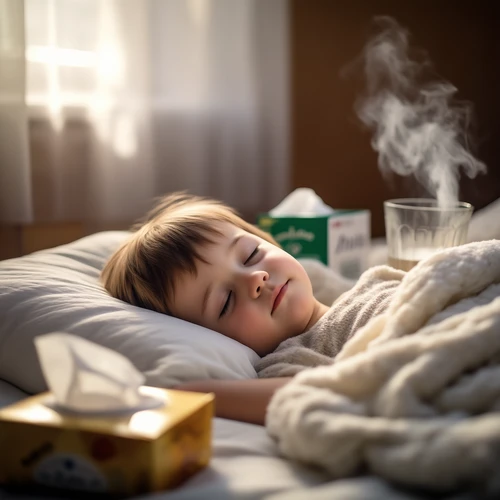Caring for a Child with a Cold or Flu: When your child comes down with a cold or flu, it can be challenging to know the best way to help them feel better. Here are some essential tips for parents in managing these common illnesses.
Understanding Colds and Flu: Colds and flu are both respiratory illnesses caused by different types of viruses. They have similar symptoms but differ in severity and duration. Colds usually cause mild to moderate symptoms that typically clear up within a week or two without treatment. The flu, on the other hand, can cause more severe symptoms such as high fever, body aches, fatigue, and chills.
Symptom Relief: Most home treatments for colds and flu focus on relieving symptoms rather than curing the illness. Here are some common remedies:
- Fever reducers: If your child has a high fever, consider giving them medication like acetaminophen or ibuprofen (only after consulting with a healthcare provider for appropriate dosage). Never give aspirin to children under age 18 due to its association with Reye's syndrome.
- Hydration: Ensure your child drinks plenty of fluids, which helps thin out mucus and prevent dehydration. Encourage them to take small sips frequently if they're not feeling up for large amounts at once.
- Steam therapy: Steam can help loosen congestion in the nose and chest. Run a hot shower and sit with your child in the bathroom, letting the steam fill the room. You can also use a humidifier in their bedroom to help keep the air moist while they sleep.
- Rest: Encourage plenty of rest so that your child's body has time to recover without extra strain.
Over-the-Counter Medications: Various over-the-counter (OTC) medications can help alleviate cold and flu symptoms in children, but they should be used with caution. Always read the label carefully for age-appropriate dosages and possible side effects. If your child is under 2 years old or has chronic health conditions, consult a doctor before giving them any medication.
When to Seek Medical Attention: While most cases of colds and flu can be managed at home, there are times when medical attention is necessary.
- If your child shows signs of difficulty breathing or rapid/difficult breathing
- Severe vomiting or inability to keep liquids down
- Fever over 102°F (38.9°C) in babies under three months, 104°F (40°C) in children ages 3-36 months, and persistent fever in older kids that doesn't respond to medication
- Worsening of symptoms or new symptoms appearing after recovery started
Maintaining Good Hygiene: Preventing the spread of colds and flu is just as important as treating them. Teach your children good hygiene practices such as frequent hand-washing, covering their mouths when they cough or sneeze, not sharing utensils with others, and avoiding contact with sick individuals.


